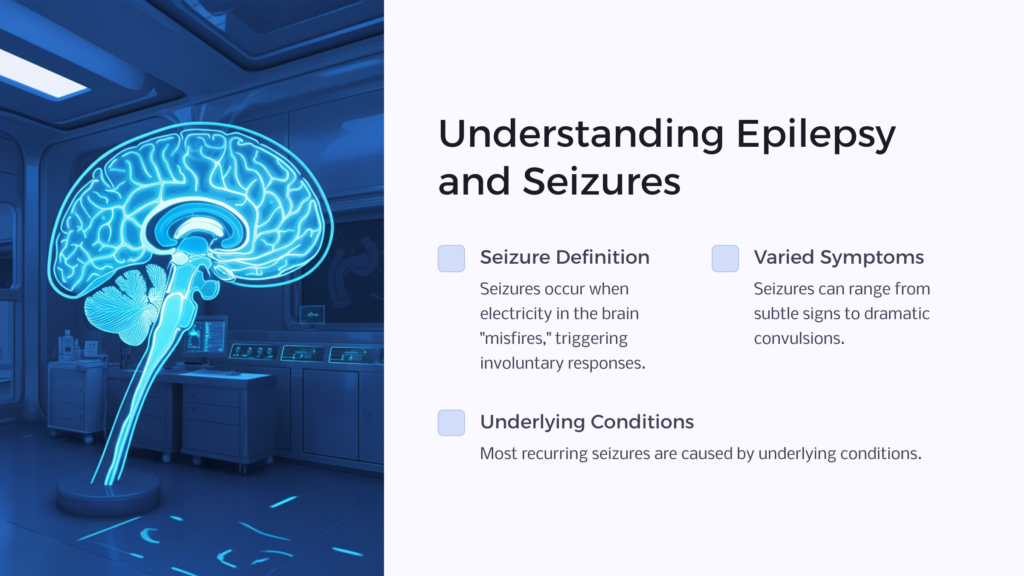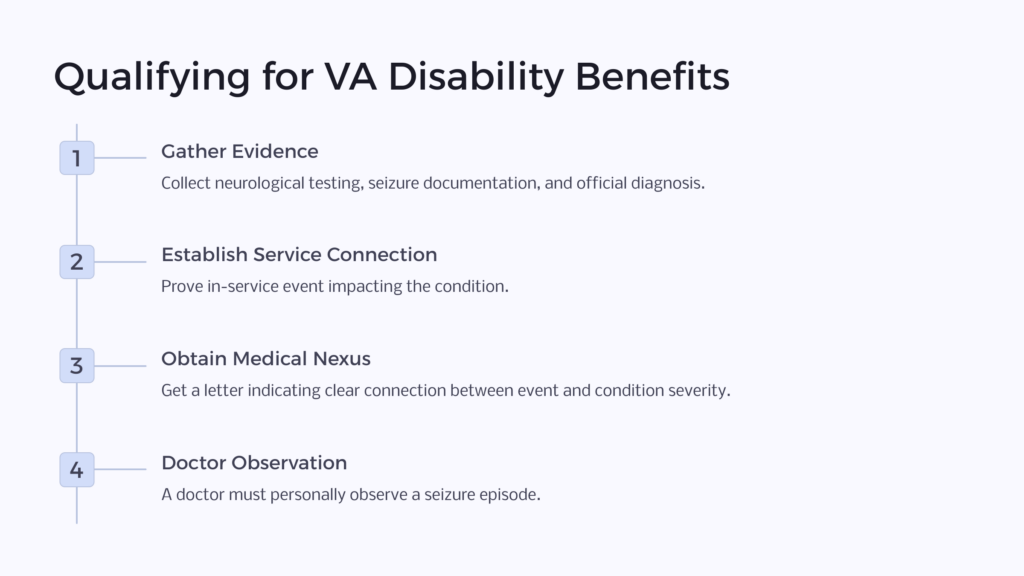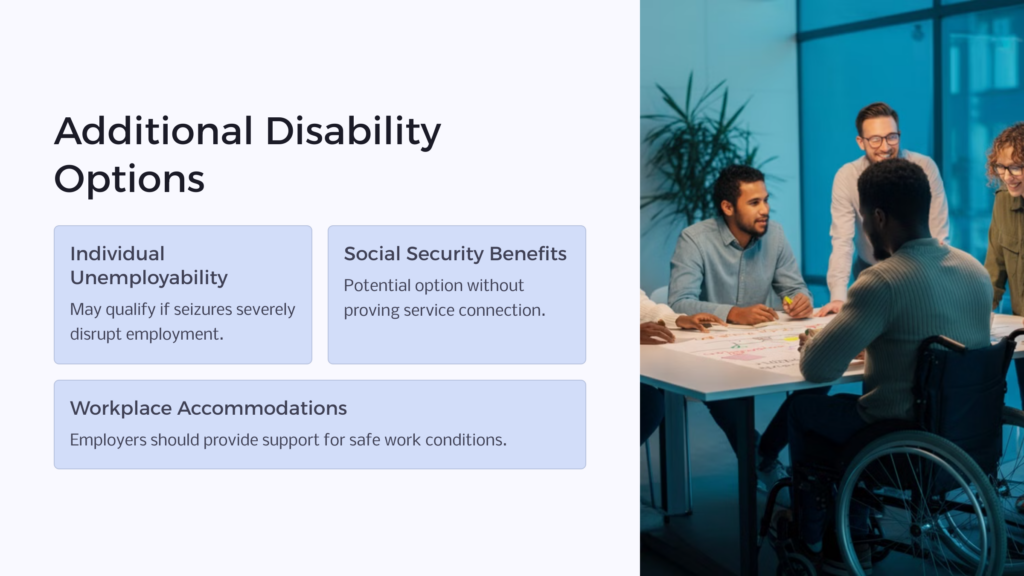Here’s the whole article in a single sentence:
Yes, some cases of epilepsy and seizure disorders can qualify for VA disability benefits—but the qualifications are very strict, and the process of proving your diagnosis meets the criteria can be a long and challenging process.
If that’s all you were looking for, we’re glad we could help. But if you’d like some more granular details about what those requirements are, and just what your journey toward receiving the benefits you qualify for will be like, well, we have that here too, so keep reading.
What Is Epilepsy, and How Does It Relate to My Time in the Service?

Epilepsy and other seizure disorders can be counted among the hosts of medical conditions that have very narrow representation in popular media. Like “split personalities” (actually called Dissociative Identity Disorder), Autism, and many other conditions, movies and TV tend to use the most dramatic representations, leaving the general public struggling to identify less obvious, and more nuanced cases.
All of that is to say that not every person who deals with seizures will look the way you might expect. Seizures aren’t characterized by fainting, severe convulsing, and loss of consciousness; those are just symptoms some types of seizures have. Some people have seizures so subtle in comparison that they may go undiagnosed their entire lives.
If that comes as a surprise, well, then there are a few things we need to cover before we jump into whether or not the VA will grant you disability benefits for a seizure-related condition you may have.
What Are Seizures?
Let’s set a baseline with a definition for the core “feature” (if it can be called that) that these conditions all share.
Seizures happen when electricity in the brain “misfires,” triggering involuntary and unintended responses. These responses come in a lot of different varieties. Some are similar to the hallmarks that dramatic movie scenes may have taught you to look for—convulsive episodes where the individual requires help to avoid hurting themselves during the uncontrolled spasms.
Others are less noticeable. A sudden, odd smell that no one else notices. Repetitive, fidgety movements like rubbing hands together. Upset stomach, altered behaviors and thoughts, migraine-like symptoms, and a whole lot more are all found on the list of possible signs of a seizure.
Some individuals lose consciousness altogether, while others lose it only momentarily, possibly even brief enough that they can continue walking or talking uninterrupted.
The point here is that the abnormal electrical discharges in the brain have effects analogous to the way muscles react to an electrical shock. The key difference is that muscles only have one possible response (they flex in a single direction). Your brain has quite a few more dials, switches, and toggles that it can mess with when it gets zapped the wrong way.
So where a muscle just “twitches,” your brain can wind up doing a lot more, including twitching virtually every muscle in the body, all at once.
What Are Seizure Disorders?
In most cases, people who deal with seizures in some form have an underlying condition that causes them to recur. There are several different categories of conditions, and they’re distinguished by a few factors, including:
- Where the seizures happen
- How widespread the seizures are
- What symptoms the individual displays during a seizure
- The root causes of the condition in question
Unfortunately, for many patients with a seizure disorder, medical professionals may have no idea what makes them prone to these abnormal discharges. Often, there are genetic precursors, but conditions don’t always manifest at birth or during early development. Or, in the case of less visible seizure profiles, it may be that they were always present, but no one knew it.
Most critical to a discussion of VA disability benefits, seizure disorders can have a separate cause (like substance abuse withdrawal, brain injury, etc.), they can be present even without a separate cause, or they can predate an external factor that exacerbates their effects after that point.
In other words, some seizure conditions can be established as service-related like any other VA-rated disability, while others might not.
How Does Epilepsy Differ from Seizure Disorders? Aren’t Epilepsy and Seizures the Same Thing?
The terms “epilepsy” and “seizure disorder” are related much like “cancer” and “tumor” are related. There is some overlap, and they’re often used interchangeably, but they’re not synonymous.
Seizure disorders include any condition that results in recurring seizures. Epilepsy, meanwhile, refers specifically to conditions with “unprovoked” seizures. These are episodes without a clear, external cause. In other words, for individuals with epilepsy, their brain struggles with these unwanted internal shocks by default, even if other factors that are known to cause seizures are completely absent.
This can make qualifying epilepsy as a VA disability somewhat complicated, as the condition often precedes a veteran’s time in the service. Despite this, even unprovoked seizures can have aggravating external factors, with traumatic brain injuries (TBI) being among the most common.
A veteran may have had epileptic episodes that were less frequent or more manageable prior to their service, only for the condition to worsen during or afterward. In these cases, especially when the seizures become an obstacle to securing and maintaining employment, it’s very possible the VA will award disability benefits for the diagnosis.
Epilepsy as a VA Disability

If you’ve been struggling with epileptic seizures, and you have good reason to believe that they’ve started or increased in severity due to your time in the service, be aware that proving it to the VA will take some effort on your part. As in, more than claims already typically do.
You’ll need a number of specific pieces of supporting evidence, including neurological testing, documentation of seizure frequency and severity, an official diagnosis, proof of an in-service event that directly impacted the condition, and a medical nexus letter that indicates the clear connection between the event and the current intensity of the condition.
Oh, and one more thing: a doctor has to personally observe the veteran experience a seizure episode. So, you know, no biggie.
There is a silver lining here, though. Epilepsy can be tied to your service through a “secondary service connection.” Here’s how it works. The veteran first establishes the service-connected nature of a different condition—such as a traumatic brain injury, or burn pit exposure—as a separate condition is often easier to prove to the VA.
Once disability status is established for the first condition, proof is then supplied connecting the seizures to it. Using TBIs as an example, this method works in your favor because of two things:
- Service members are at dramatically increased risk of experiencing TBIs, and TBIs often count as “presumptive conditions” as a result.
- TBIs are a major risk factor for epileptic seizures, with some people experiencing a spike in severity after a TBI, and others only experiencing seizures in the wake of the head injury.
Establishing service connection for epilepsy is rarely easy, but if the seizures you experience are severely disrupting your life on a regular basis, you owe it to yourself to try and secure the benefits you qualify for.
Epilepsy and Other Disability Designations

Seizures can be problematic and disruptive for a large number of professional roles, and that can make it a real problem to try and hold down a job. If the symptoms are severe enough, you may qualify for Individual Unemployability benefits from the VA. But in the event that the benefits you are awarded still leave you with a gap in the finances, you may have to try to find work regardless.
In that case, you might still have recourse through other channels. For example, the condition could potentially qualify you for disability benefits from Social Security. Proving your disability with the Social Security Administration will still be difficult, as the metrics they use are likewise very strict. But here at least, you won’t have to prove the service connection, removing that burden from the equation.
Beyond that, there may also be steps you can take to secure accommodations from your employer. We’ll stop short of offering legal advice here, but any employer worth their salt should be willing to help you to safely do your best work for the organization. If they don’t, we can neither confirm nor deny the possibility of significant positive outcomes from taking legal action.
Final Thoughts
We’ve done our best here to avoid digging too far into highly technical information here, but we’ve definitely covered some weighty details on an important topic. So, let’s step away from the legalities and bureaucracies for a moment, and wax slightly philosophical.
It’s tempting to shackle a person’s worth to their ability to “give back” to society—achieving financial independence, supporting their family, providing value to the local community, and proving an asset to society at large.
You may even face people in your life who reinforce this viewpoint. Perhaps people who should really be your biggest supporters and defenders as you deal with a challenge few even understand at the most basic level.
Don’t let that narrative be the one you adhere to internally. We don’t evaluate infants by what they offer their families. Nor do we treat our pet dogs and house cats differently if they don’t “pull their weight.”
Forgive us if this sounds a bit forward, but we’d like to suggest that each of us has inherent value, and that we have a right to our lives, and the basic necessities those lives require. The orphan is no less deserving of food because they can’t pay for it themselves. Similarly, you are not your condition, and your value isn’t dictated by your level of productivity and profitability.
You deserve recognition for your challenges, and support in your struggles. We’re here to help with that, but wherever your efforts to secure that aid take you, we salute you.
 Benefits.com Advisors
Benefits.com Advisors
With expertise spanning local, state, and federal benefit programs, our team is dedicated to guiding individuals towards the perfect program tailored to their unique circumstances.
Rise to the top with Peak Benefits!
Join our Peak Benefits Newsletter for the latest news, resources, and offers on all things government benefits.



















